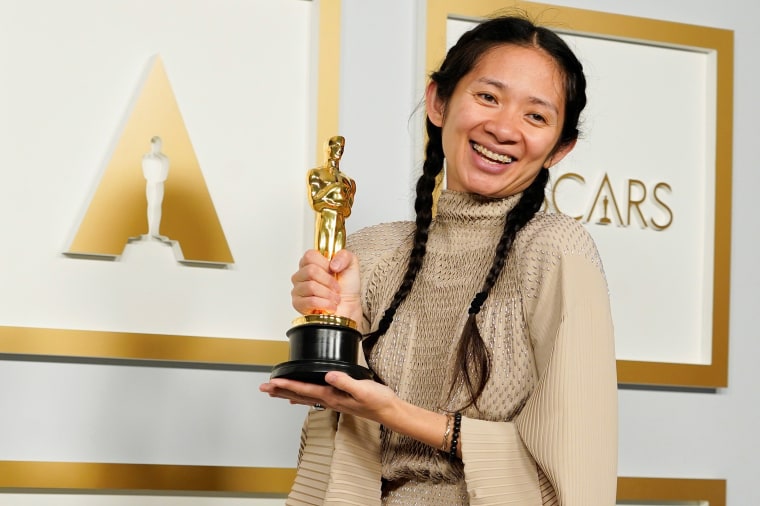The producers of the 93rd Academy Awards were handed an unenviable assignment.
They were tasked with putting on a lively show that resurrected both the rarefied glamor of vintage Hollywood and the comforting normalcy of life before the pandemic — all while abiding by a laundry list of Covid-19 safety protocols. If they succeeded, the thinking went, they just might be able to stave off a record-low ratings disaster and maybe even drive some Americans back to movie theaters.
It remains too early to say whether the crew behind the Oscars entirely succeeded in their head-spinning marching orders. But for viewers at home — spending the umpteenth night on their couches and perhaps only vaguely aware of the modestly scaled movies contending for best picture — the ceremony might have felt strangely half-formed, like an unfinished screenplay.
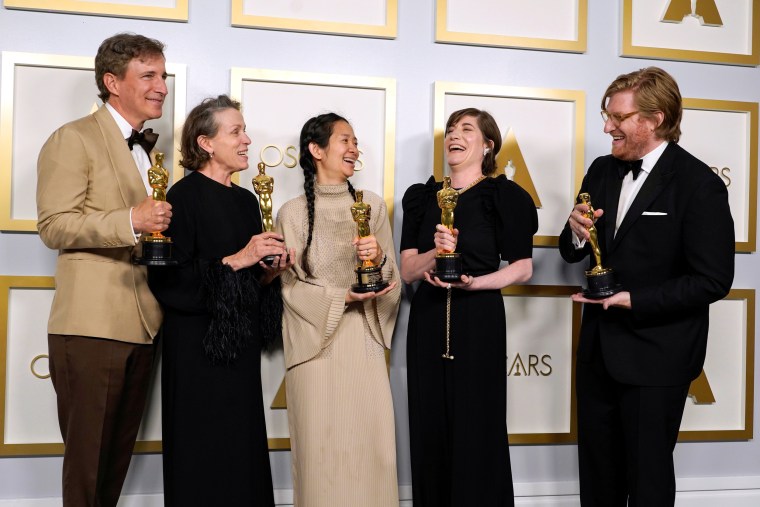
The night got off to a strong start. In an elegant tracking shot that opened the show, Regina King confidently strode through Union Station in downtown Los Angeles as stylish candy-colored credits washed over the screen. It felt like the prologue to a wry caper that might have been helmed by one of this year's co-producers, the innovative director Steven Soderbergh ("Ocean's Eleven").
King then took the dais and delivered opening remarks before a group of nominees and their guests, seated at cocktail-style tables straight out of a 1930s jazz club. You need not have been a fan of David Fincher's "Mank" to appreciate the interesting fusion of old-school Tinseltown, Art Deco aesthetics and Covid-era social distancing.
But then something curious happened. The ceremony, for all its admirable attempts to smash tired awards show formulas and create a more intimate ambience, seemed to go on autopilot. Yes, there were charming speeches and historic wins, including at least one shocking upset. And yet much of it felt stiff and sleepy: few jokes, minimal schtick, no musical numbers.
Here's the full list of winners.
Hollywood has long styled itself as the national dream factory. It might be fair to say this year's Academy Awards telecast was sometimes dreamlike, at least in its occasional drowsiness and intermittent flights of surrealism, such as when "Hillbilly Elegy" nominee Glenn Close twerked to "Da Butt," a track from Spike Lee's "School Daze." (Close's seemingly impromptu performance was reportedly a scripted bit.)
In the end, though, Hollywood's big night nonetheless offered up a handful of memorable moments that were moving, historic, surprising and — at least when it came to the last award — downright jaw-dropping. Here's a look at the highlights.
'Nomadland' triumphs, Chloé Zhao makes history
It was a glorious night for "Nomadland," Chloé Zhao's elegiac portrait of a fiercely independent wanderer named Fern (Frances McDormand) who hits the open road after the death of her husband and the collapse of her Nevada factory town. The film, distributed by the Disney-owned label Searchlight Pictures, claimed best picture honors.
Zhao, who is Chinese, became the first woman of color, and only the second woman, to win the award for best director. Eleven years ago, Kathryn Bigelow was honored for the tense Iraq war thriller "The Hurt Locker," which also won best picture.
“I’ve been thinking a lot lately of how I keep going when things get hard,” Zhao said in her acceptance speech, referring to a Chinese poem she said she used to read with her father that opened with the phrase “People at birth are entirely good.”
“This is for anyone who has the faith and courage to hold on to the goodness in themselves and to hold onto the goodness in each other,” said Zhao, who returns to screens in November with the Marvel epic "Eternals."
McDormand returned to the stage near the end to accept her third best actress Oscar. (She previously won for 1996's "Fargo" and 2017's "Three Billboards Outside Ebbing, Missouri.")
“Please watch our movie on the largest screen possible,” McDormand said. “And one day very, very soon, take everyone you know into a theater, shoulder to shoulder in that dark space, and watch every film that’s represented here tonight.”
The best actress prize was widely expected to go to Viola Davis for "Ma Rainey's Black Bottom" — which would have made her only the second nonwhite woman to win in that category, after Halle Berry.
In stunning upset, Anthony Hopkins wins best actor
Chadwick Boseman, who died in August, was one of the most magnetic and commanding actors in contemporary Hollywood. The pandemic year brought us the release of Boseman's final pair of movies: Spike Lee's fiery "Da 5 Bloods" and George C. Wolfe's "Ma Rainey's Black Bottom."
Boseman was widely expected to posthumously earn the best actor Oscar after winning equivalent prizes at the Golden Globe Awards, the Screen Actors Guild Awards and other events. Boseman's victory seemed assured after it became clear that the best actor category had been saved for last, potentially to end the night on an emotionally powerful climax.
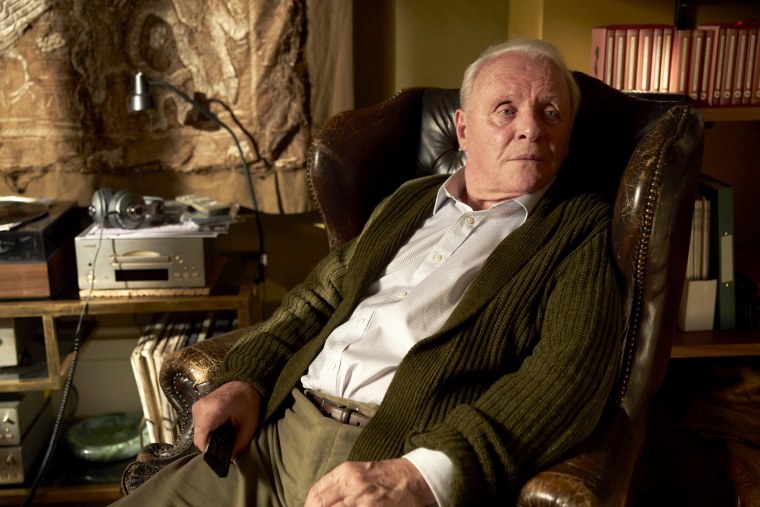
But in what surely constituted the biggest surprise of the show, the best actor trophy instead went to screen veteran Anthony Hopkins for his portrayal of a dementia-addled man in Florian Zeller's "The Father." Hopkins delivered a layered performance in a challenging film, to be sure. But his upset over Boseman felt to many viewers like a gut-punch.
Hopkins, who won an Oscar for his iconic turn as Hannibal Lecter in Jonathan Demme's "The Silence of the Lambs," was not on hand to accept the award; Joaquin Phoenix, who introduced the category and won last year for his title role in "Joker," accepted it on Hopkins' behalf.
Boseman's win would have made him only the third actor to posthumously win an Oscar, after Peter Finch ("Network") and Heath Ledger ("The Dark Knight").
In a tweet, the film producer Franklin Leonard said: "Honestly not even stressed about Chadwick not winning, because I know Chadwick wouldn’t have been stressed about not winning.
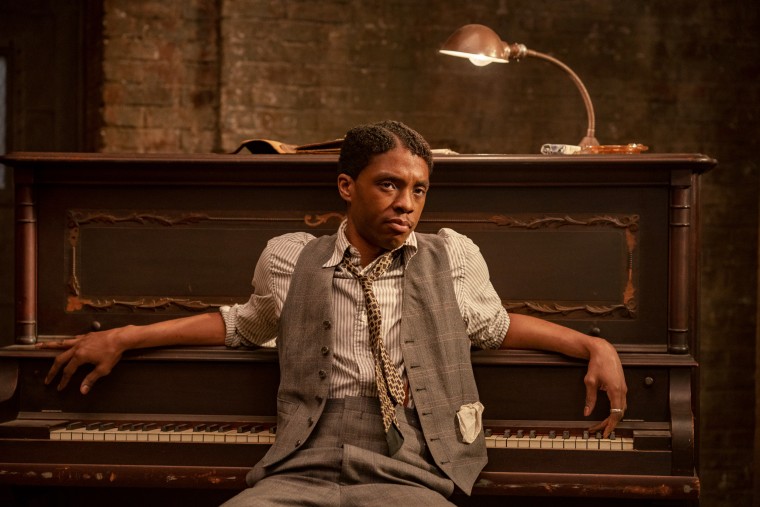
"He would, however, want us to go back to work tomorrow aiming unconscionably high in both art and humanity," said Leonard, who is the founder of the Black List, an annual survey of well-regarded but unproduced scripts. "So that’s what Imma try to do."
Daniel Kaluuya and Youn Yuh-jung ace their speeches
Daniel Kaluuya, who won best supporting actor for his galvanizing portrayal of slain Black Panthers leader Fred Hampton in Shaka King's "Judas and the Black Messiah," delivered an impassioned acceptance speech near the beginning of the night.
Kaluuya, who co-starred in "Judas" alongside fellow nominee LaKeith Stanfield, began his remarks with an expression of unbridled joy ("Bro, we out here!") before turning more serious, paying tribute to Hampton, who was killed in a police raid in 1969. "What a man. What a man," Kaluuya said.
"When they played divide and conquer, we say unite and ascend," Kaluuya added.
But his speech also featured one of the event's most memorable one-liners. Kaluuya, acknowledging his parents, said: "My mom, my dad — they had sex, it’s amazing! I’m here! I’m so happy to be alive.”
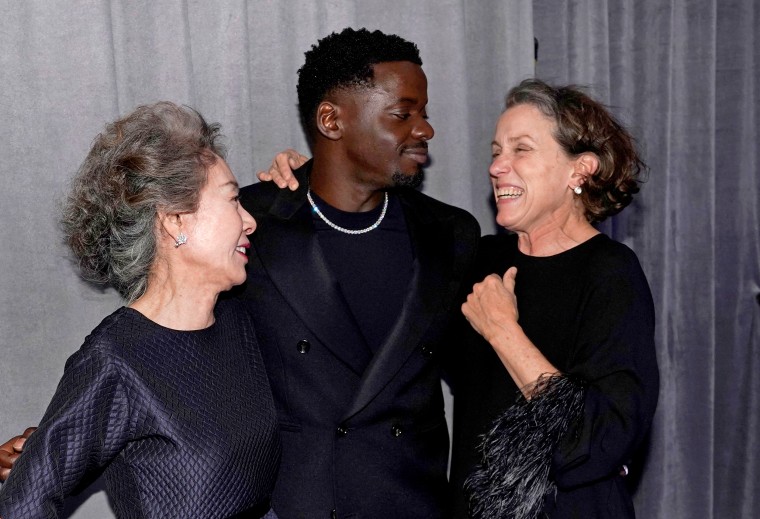
Youn Yuh-jung, the veteran Korean actress who drew critical raves for her performance as a feisty grandmother in the tender family drama "Minari," treated viewers to similarly enjoyable remarks.
"I don’t believe in competition, how can I win over Glenn Close?” Youn said. “Tonight, I have just a little bit luck, I think, maybe. I’m luckier than you. And also maybe it’s American hospitality for the Korean actor. I’m not sure. But anyway, thank you so much.”
Close, who was nominated for "Hillbilly Elegy," now jointly holds the record with Peter O'Toole for most Oscar nominations without a single win, notching eight apiece.
Youn accepted the award from Brad Pitt, an executive producer on “Minari" and last year's best supporting actor winner for Quentin Tarantino's "Once Upon a Time ... in Hollywood."
“Mr. Brad Pitt, finally,” said Youn. “Nice to meet you.”
